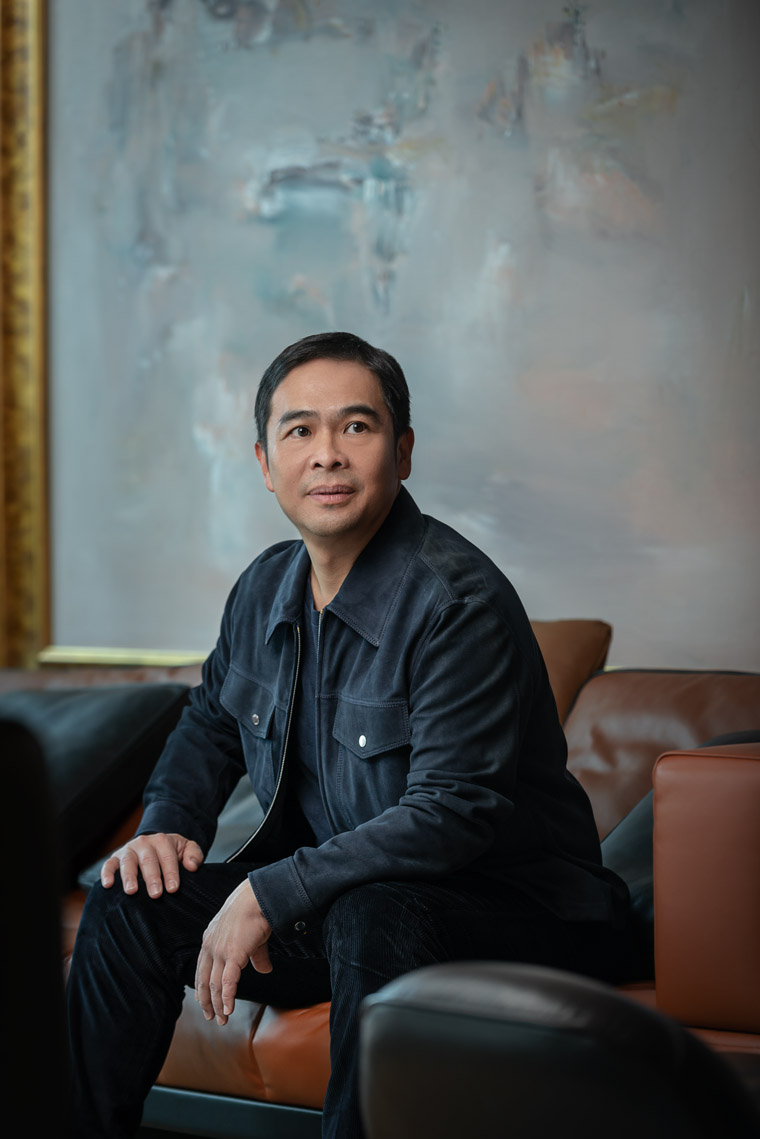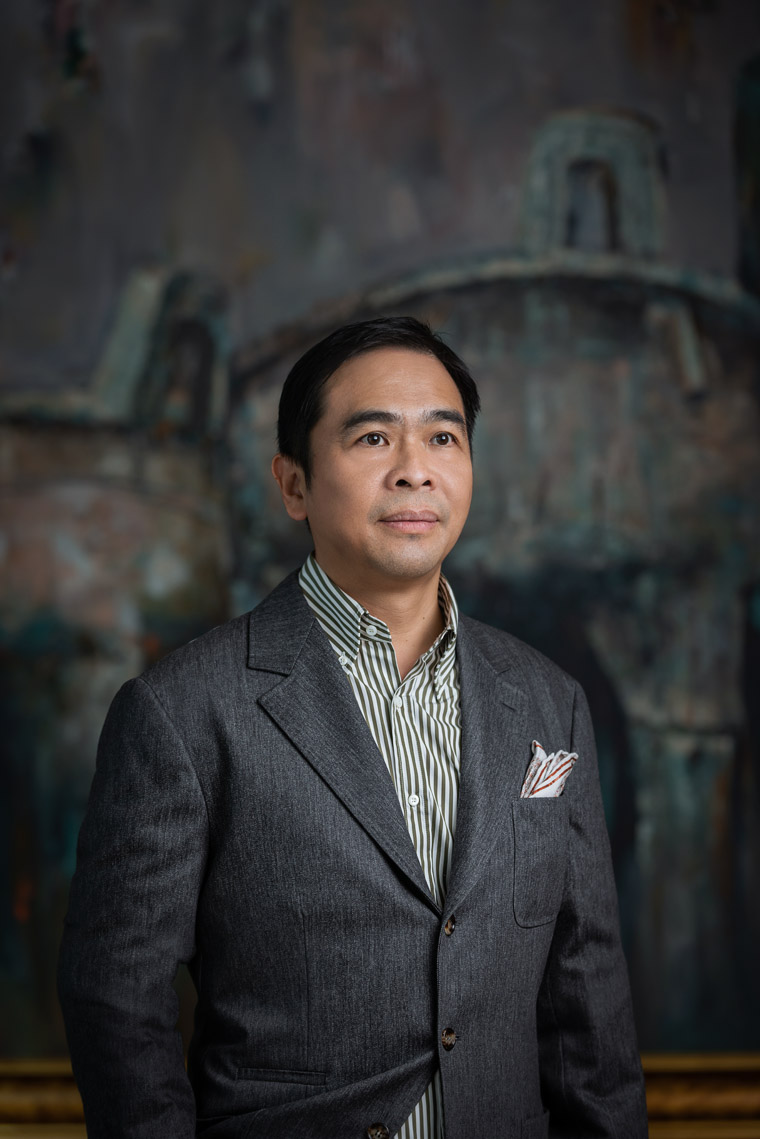December is typically an opportune time for introspection, particularly for a curveball of a year like 2020. While things may not have gone right for most, it presented us with lots of time to reflect; to look back on better days, assuring us that the light at the end of the tunnel is hopefully just around the corner.
This dictated the approach of our conversation with Kenneth Goi, Chief Operating Officer and Executive Director of GSH Corporation, and son of billionaire businessman, Sam Goi, who is the chairman of both Tee Yih Jia Foods and GSH. For the 47-year-old father of three, his childhood was a good jumping off point for the conversation.
“Growing up, I remember how busy my parents were building up the business, so I spent a lot of time hanging around the Tee Yih Jia factory or office. It was normal for my siblings and I to help out with tasks here and there, which seemed like a fun thing to do as a kid,” recalls Goi. Compared to most families, this might not have been the norm, but Goi appreciates it, as he was able to witness his father’s hard work and sheer determination.
- FROM THE GROUND UP
- POWER TO THE PEOPLE
- KEEP MARCHING
From the Ground Up
Even as a child, Goi knew that his father was an entrepreneurially driven person who believed that if a product is good, it can be sold to anyone. “As a teenager, he would bring my siblings and I to work functions and we’d have an ‘informal debriefing’ later on. He would explain to us what the work event was all about and tell us more about the people we met. Since this was the norm in our household, it was instilled in us that being an entrepreneur is all about curiosity. It allowed us to be aware; to start wondering about things; to ask why people do what they do. To a certain extent, that’s probably deeply rooted in the DNA of being a successful entrepreneur.”
Speaking of his own experience at Tee Yih Jia, Goi reveals that everyone was hands-on, starting from the ground up. To this, Goi poses a valid question: “How can one be a manager if you don’t know what’s happening in the warehouse or in production? This is something I experienced in the early days of my career. I too was posted in the warehouse, in manufacturing, and later on in China to witness an entire factory being set up. This experience allowed me to get to know both management and staff, which helped in the long run especially when you are tasked to manage the entire operation."
(Related read: Putting things back in place)
 Kenneth wears jacket and trousers from Dunhill
Kenneth wears jacket and trousers from Dunhill
Today, Goi finds himself on a successful path and credits it to the encouragement from both his father and grandfather to “just be yourself”.
“After college, one of the challenges I remember facing was knowing how successful my father was and I found it very difficult to step out of his shadow. People on the outside would say that no matter how much hard work you put in, the credit will always lead back to the family or to my father,” he reveals.
But it was the reminder to simply be himself that shook off self-doubt. “When I learned to be comfortable with who I was, that’s when I realized that it’s probably not that important to step out of the shadow. I shifted my perception and saw it as something beneficial that led to opportunities in the long run. Today, I see myself as someone well equipped to ensure business continuity and greater success.”
- FROM THE GROUND UP
- POWER TO THE PEOPLE
- KEEP MARCHING
Power to the People
Goi’s role as COO at GSH sees him wearing many hats, but what brings him the most satisfaction is when he is able to create impact in the lives of the people around him. “At GSH, we are in the business of hospitality and real estate development, so everything I do is people-centric. Internally, I work with staff, and on the other hand, guests and clients. In my role, what gives me fulfillment is when I am able to identify the right person internally for the right job. On the business front, it is when I am able to identify a client that is able to buy their dream home from one of our developments.”
However, Goi’s people-centric approach was put to the test earlier this year when COVID-19 hit.
 Kenneth wears shirt, blazer, and pocket square from Brunello Cucinelli
Kenneth wears shirt, blazer, and pocket square from Brunello Cucinelli
“In the first few months it all happened, we were preparing for it, but we were not sure how severe the situation was going to be. It could’ve been like SARS and be contained in a few months, so we tried not to jump the gun. We looked at the sustainability of the business, but after one or two months where you could hardly see light at the end of the tunnel, it got a bit trickier. We shared with the management team that the people working for us are our core asset. Whatever restructuring plans we were planning wouldn’t be easy because whatever the result was, it was going to impact all individuals and their families. However, we needed to be as transparent as possible to all the staff, regardless of role – from managers all the way to the cleaners. We opened communication channels where they would have full access to top management should they want to air their concerns. Going forward, we still had to cut back on hotel manpower, starting with part-time staff and external contractors. Prior to this, we had about 2,200 staff overall, but now it has been reduced to 1,500 to 1,600, which is still a decent number. I consider ourselves blessed that the staff still supports and believes in us amidst the restructuring. In turn, we promise to give them assurance that things will get better. Sometimes, we all have to make difficult decisions. But when you put the human factor in place, a lot of decisions seem to be a lot more simple.”
Still hopeful, Goi shares, “I would say this was a good time for us to also look at who our strategic partners are, as well as the colleagues who will stand behind us regardless of the situation. You’ll begin to realize who will fight and work for you unwaveringly. These are the people you have to remember.”
- FROM THE GROUND UP
- POWER TO THE PEOPLE
- KEEP MARCHING
Keep Marching
While GSH’s hospitality arm, which is comprised of properties in Malaysia like Sutera Harbour Resort, The Magellan Sutera Resort, and Sutera Harbour Marina Golf & Country Club, takes it slow because of travel restrictions, things are looking quite rosy for the residential projects.
 Sutera Harbour Resort
Sutera Harbour Resort
One important lesson for Goi is the need to embrace digital technology – to a certain degree. “The norm for us these days, especially with our residential properties in Kuala Lumpur and elsewhere in Malaysia, would be e-viewings through Zoom or WhatsApp, 3-D showrooms, and virtual concierges. While these digital capabilities are a good way to introduce our projects to a bigger audience, my personal opinion is that people still want a full, physical experience of viewing a property – from feeling the finishes, scrutinizing workmanship, to chatting with the developers. For investments like this, face-to-face interaction is really quite necessary at the end of the day.”
Of the other GSH projects in the pipeline that require Goi’s attention, there are two that stand out. “We have a residential project coming up in Kuala Lumpur in Petaling Street. It’s a beautiful plot in the midst of Chinatown with rich heritage. In terms of infrastructure and transport, it is well connected with the LRT and MRT. It is a project that we wanted to deliver to a more local market, particularly white collar workers looking to upgrade.”
The other project is a mixed property project in Chongqing, China. “It will be on land we acquired last December,” he reveals. “It is comprised of a hotel and residential development within the same area. This is very exciting and we are going full force on this one because the location is dedicated for the domestic market. It is located 40 minutes away from Chongqing’s city center, so people can expect more affordable property prices, and most importantly, fresh air and greenery.”
With the two projects currently underway, Goi is patiently staying put in Singapore, reflecting on the business while taking advantage of extended periods of family time. “I find that this is a good period for us at work to look back on our corporate culture, direction, and investment strategies. We have been a bit more conservative with the business over the years and it has thankfully benefitted us during this uncertain time, lending assurance for both stakeholders and staff.”






 Kenneth wears jacket and trousers from Dunhill
Kenneth wears jacket and trousers from Dunhill
 Kenneth wears shirt, blazer, and pocket square from Brunello Cucinelli
Kenneth wears shirt, blazer, and pocket square from Brunello Cucinelli
 Sutera Harbour Resort
Sutera Harbour Resort




 Back
Back